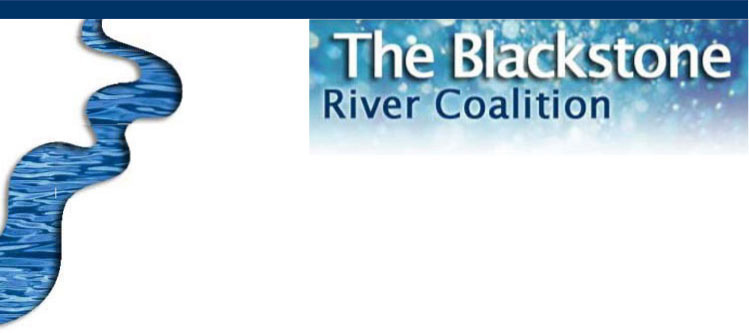 History of the Blackstone
History of the Blackstone |
National Historical ParkNational Heritage Designation |
American Heritage Designation
We are here because the Blackstone is a beautiful river of national significance that still needs a tremendous amount of help to be restored to fishable/swimmable water quality standards. With your help, we can make this happen.
The Blackstone River Coalition
The Blackstone River Coalition (BRC) is a partnership of numerous organizations, businesses, agencies, municipalities and individuals working to restore the Blackstone River and to improve the health of the Blackstone River watershed.
The BRC's mission is to restore and protect water quality and wildlife habitat in the river corridors, and to advocate for sound land use in the Blackstone River watershed.
A partnership of member organizations, the Blackstone River Coalition seeks to enhance communication, efficiency, and the interaction among community stakeholders, state agencies, and federal agencies as we work together to achieve our mission.
The BRC will coordinate efforts to fully implement the Campaign for a Fishable/Swimmable Blackstone River.
What's a Watershed?
A watershed is the land over which rain and snowmelt drain to a particular waterbody.
The Blackstone River watershed stretches from the brooks that form its headwaters in Worcester, Massachusetts, to its mouth in Pawtucket, Rhode Island. There, it joins the Seekonk River which flows to Narragansett Bay in Providence. Along the way the Blackstone is joined by six major rivers, in addition to many smaller tributaries. These waterways drain a land area of over 545 square miles and include over seven thousand acres of ponds, lakes and reservoirs. Together, all of this land and water is the Blackstone River watershed, and it is a very dynamic system.
Whatever land uses occur within the watershed impact the quality of all the rivers, streams, lakes and ponds. Pollution on the land gets washed into waterways directly, or into the stormdrain system in our roadways that then drains directly to the nearest waterway. There is a direct connection between land use and water quality, and the Blackstone River Coalition works collaboratively to protect land uses that have positive impacts on our waterways, and to improve land uses that have negative impacts.
A River of National Significance
The Blackstone is a river of national significance, as evidenced by the designations of the John H. Chafee Blackstone River Valley National Heritage Corridor, an American Heritage River and Urban River Restoration Initiative Pilot. Known as the Birthplace of the American Industrial Revolution, the Blackstone River's legacy of intense industrial development left its waters polluted and its course forever altered. Industrial activity and accompanying settlement left the river severely polluted with untreated sewage, detergents, solvents, heavy metals and other industrial wastes. The presence of numerous dams, canals and other human interventions means that little remains of its natural, free-flowing state.
A 1990 report sponsored by the EPA termed the Blackstone River the most polluted river in the country with respect to toxic sediments. While toxic sediments trapped behind industrial-era dams continue to plague the long-term health of the River, considerable headway in water quality improvement has been made since the early 1970's. Yet it still does not meet the water quality standards that the Clean Water Act of 1972 mandated to be met by 1987.
Because of this national significance, we are inviting people to visit here,to invest here, and to raise their families here. Yet the Blackstone is still not clean. When people talk about the high costs of implementing measures to improve water quality such as implementing nutrient limits at the wastewater treatment plants, they really need to talk about the costs of not implementing them - the fish kills, the closed shellfish beds, the lost economic and recreational opportunities and quality of life that a clean river provides.
Our National Designations:
National Historical Park
On December 19, 2014, President Obama signed the legislation that established the Blackstone River Valley National Historical Park, the 402nd park in the national park system. The same legislation also extends the authorization of the John H. Chafee Blackstone River Valley National Heritage Corridor for six years, through the end of Fiscal Year 2021, and adds the Town of Auburn, Massachusetts, and additional portions of Providence, Rhode Island to the Heritage Corridor.
Urban River Restoration Initiative
In July 2002, the U.S. Environmental Protection Agency (EPA) and the U.S. Army entered into a memorandum of understanding to address water quality issues, economic revitalization, and the public use and enjoyment of urban rivers. The two agencies agreed to designate eight (8) demonstration pilot projects to coordinate the planning and implementation of urban river cleanup and restoration. The Blackstone is one of those pilot projects. An Urban Rivers pilot designation will bring about increased coordination and cooperation between the EPA and the U.S. Army Corps of Engineers with respect to restoring degraded urban rivers and will involve remedial, water quality, and environmental restoration activities related to each agency's respective authorities.
American Heritage River Designation
In August 1998, President Clinton declared the Blackstone River an American Heritage River. The American Heritage Rivers initiative is an innovative response to help river communities that seek federal assistance and other resources to meet some tough challenges. Without any new regulations on private property owners, state, local and tribal governments, the American Heritage Rivers initiative is about making more efficient and effective use of existing federal resources, cutting red-tape, and lending a helping hand.
National Heritage Designation
Recognizing the national significance of the Blackstone River Valley, Congress established the John H. Chafee Blackstone River Valley National Heritage Corridor Commission in 1986 to assist in protecting and celebrating the Birthplace of the American Industrial Revolution. The Blackstone River Valley National Heritage Corridor is composed of 24 cities and towns on 454 square miles of land in the Blackstone River watershed. Unlike a more traditional National Park, the Heritage Corridor does not own or manage any of the land within its boundaries. Instead, the Heritage Corridor Commission works in partnership with a variety of Federal, State and local agencies, along with many non-profit and private organizations to protect not only the sites and resources of the Blackstone Valley, but to maintain the spirit of innovation and ingenuity that makes this a special place.
 Blackstone River Coalition
Blackstone River Coalition
P.O. Box 70477 Worcester MA 01607
info@zaptheblackstone.org
Send web comments to: web@zaptheblackstone.org










 Blackstone River Coalition
Blackstone River Coalition